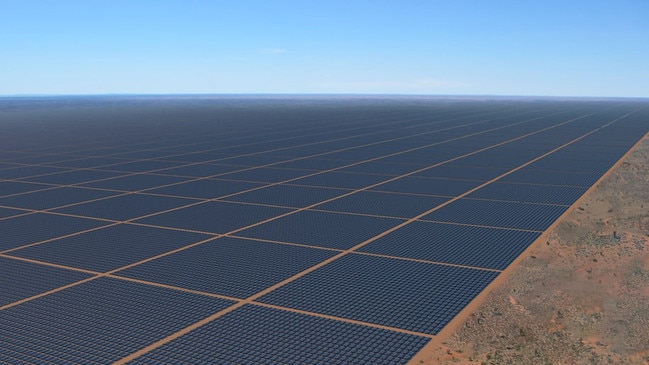Macquarie and Moelis have won the mandate to find $35bn to make Twiggy and Cannon-Brookes’ green dreams a reality
Sun Cable, the ambitious renewable energy project backed by Andrew Forrest and Mike Cannon-Brookes, has formally launched the effort to land the $35bn needed to make the dream come true.

The $35bn Sun Cable project backed by Andrew Forrest and Mike Cannon-Brookes has appointed financial advisers at it chases one of Australia’s biggest ever financing packages to bankroll its ambition of exporting power to Asia by the end of the decade.
Sun Cable’s Australia-Asia Powerlink scheme, which plans to export green electricity from the Northern Territory to Singapore, needs to raise more than $30bn in debt and equity by the end of 2023 to back its plans, with the company on Monday tasking Macquarie, Moelis & Company and MA Financial group as its financial advisers for the massive task.
Sun Cable Founder and chief executive David Griffin told The Australian the company had already fielded multiple approaches from investors keen on entering the project at an early stage, but had not yet nailed down its preferred mix of debt and equity.
Chief financial officer Kiran Raj said first task for Macquarie and Moelis would be to help Sun Cable settle on the best mix of debt and equity funding, as the group looks for new equity investors as well as debt funding.
“In the last few years, there’s been a lot of capital flight in terms of ESG investments. A lot of funds from financial institutions, and everything from sovereign all the way down to private equity – have had a direct mandate to raise long dated funds,” he said.
Mr Griffin said its advisers would be chasing funding from local and international banks, global pension and superannuation funds, and even partnerships from cashed-up oil and gas companies as it looks to fund its gigantic renewable energy project.
“While we’ve been going through this process of appointing our financial advisers, we are constantly approached by third parties with an interest in investing in the project. There is an abundance of capital out there,” he said.
“Pension funds and that type of entity will almost certainly be in the mix. Our long infrastructure is obviously something that‘s of interest to those types of investors. But oil and gas is a sector where they have spoken about transitioning their investments for a very long time, and that’s starting to actually turn into real investments now. So I think that that’s an area that’s also going to have a strong level of interest.”
Global energy giant BP recently confirmed it has taken a major stake in another major Australian renewable energy project, confirming in mid-June it will take a 40.5 per cent operating stake in the Asian Renewable Energy Hub alongside existing partners including Macquarie, Intercontinental Energy and CWP Global.
Unlike AREH, which has switched its primary focus to green hydrogen production, Sun Cable still plans to deliver energy direct to Darwin and Singapore through a long-distance cable.
The Sun Cable project will deliver 17-20 gigawatts of solar electricity generation and 36-42 gigawatt hours of battery storage, to be developed at Powell Creek, north of Tennant Creek.
A 6.4GW, 800km overhead transmission line will carry power from Powell Creek to Darwin, with a 4200km subsea cable then moving electricity from Darwin to Singapore, where it aims to provide 15 per cent of the Asian nation’s needs.
Sun Cable raised $210m of new funding in March to push ahead with its signature clean energy scheme, with fresh funds ploughed in by Mr Forrest and Mr Cannon-Brookes.
Sun Cable is still to complete its final front end engineering design (FEED) study for the project, and Mr Griffin was coy when asked when he expected the studies to be finalised.
Global supply chains are still facing major constraints and multiple Australian resources companies have complained of a blowout in waiting times for equipment and modules for major construction projects.
Mr Griffin said Sun Cable was “very conscious” of supply chain constraints, and – given it plans to begin construction by early 2024 – was aware the company would need to find a way to lock in orders for key equipment ahead of the full financial closing of its funding needs.
“We’re very conscious of the long lead items. And we’ll have more to say about that. But probably not till towards the end of this year. We’ve got a few tools that we can use to ensure that supply chain is not driving the schedule,” he said.


To join the conversation, please log in. Don't have an account? Register
Join the conversation, you are commenting as Logout